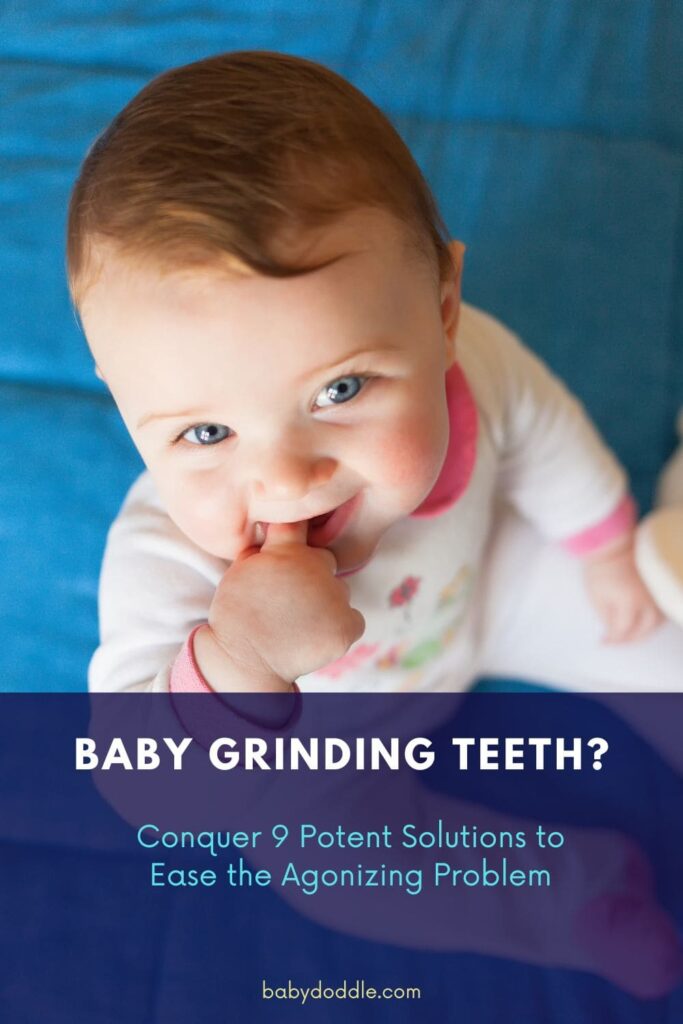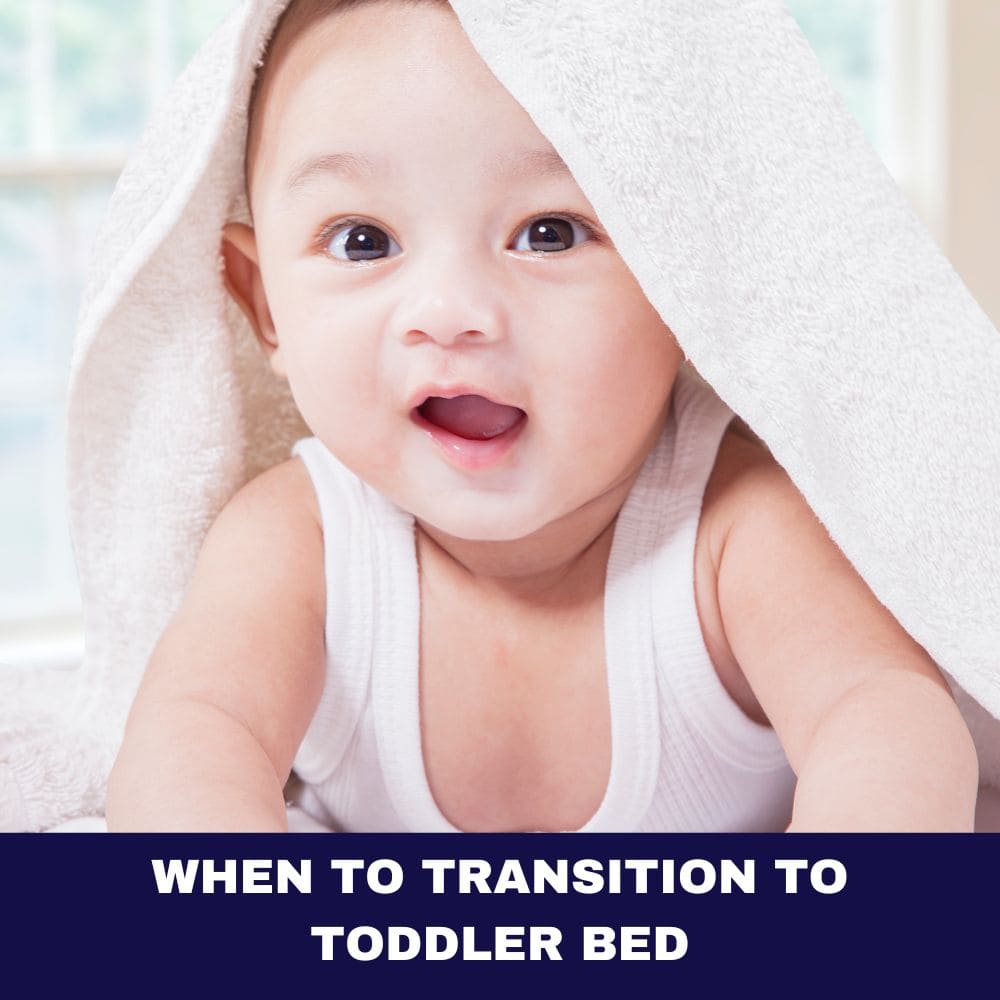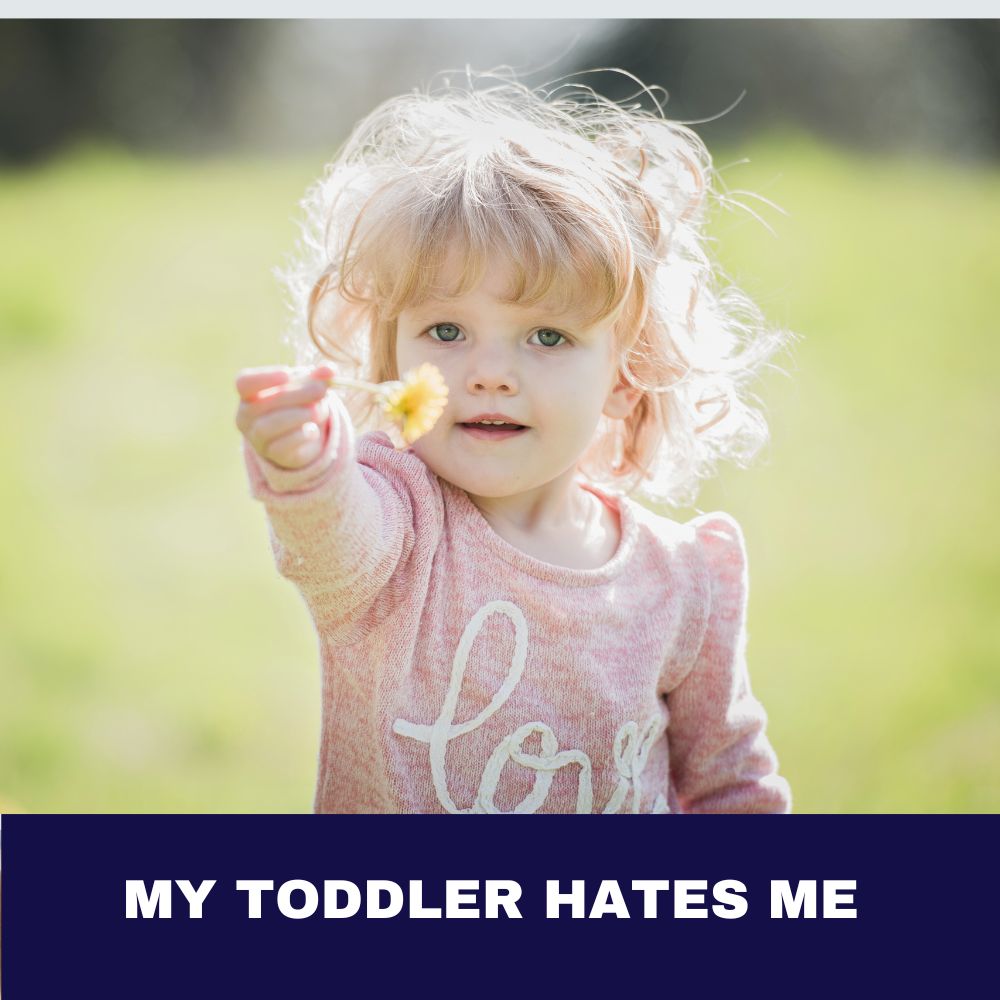Being a parent is one of life’s greatest joys, but it also comes with its fair share of challenges. One such challenge that can leave you feeling equal parts confused and concerned is when your precious little one starts grinding their teeth. That unmistakable squeaky, grating noise is enough to make any parent’s heart skip a beat. But take a deep breath – this is actually a very common issue among infants and young children.
In fact, studies suggest that a whopping three out of every four babies experience some degree of teeth grinding, also known as bruxism in the medical world. While it may seem bizarre, there are several potential reasons behind this peculiar behavior. Let’s explore them one by one:
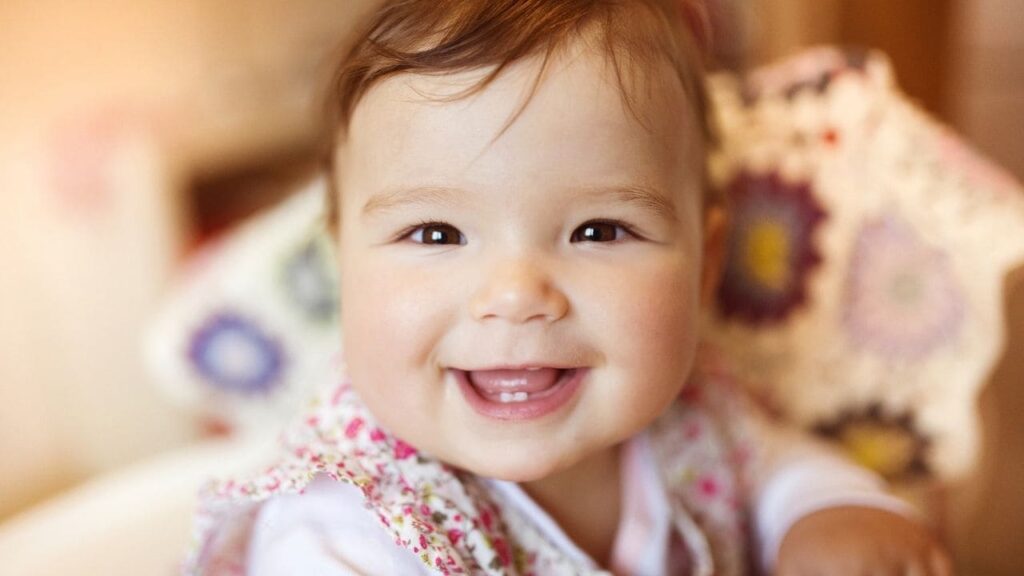
Everything You Need to Know About Baby Grinding Their Teeth
You’re not alone if you’ve found yourself lying awake at night, straining to hear that telltale grinding sound coming from your baby’s nursery. It’s a noise that can be both unnerving and perplexing, especially for first-time parents who may have never encountered this phenomenon before.
The questions start swirling in your mind: “Is this normal? Should I be worried? What’s causing my little one to grind their teeth like that?” Well, fear not, dear parents. This is a widespread issue, and in most cases, it’s nothing to panic about. However, understanding the underlying causes can help you better address the problem and provide your baby with the comfort they need.
When Do Babies Start Grinding Their Teeth?
Believe it or not, some babies may start grinding their teeth as early as a few months old, when their first few precious pearly whites start to make an appearance. However, the habit is most commonly observed between the ages of one and four years, when a complete set of baby teeth has emerged.
Types of Grinding
It’s important to note that there are two main types of bruxism (the fancy term for teeth grinding) in babies:
- Sleep bruxism: As the name implies, this is when the grinding occurs during sleep. It’s often the type that parents first become aware of, as they hear that unmistakable sound coming from the nursery at night.
- Awake bruxism: This is when your little one grinds their teeth while they’re awake and going about their day. It can be easier to overlook at first, but it’s just as important to address.
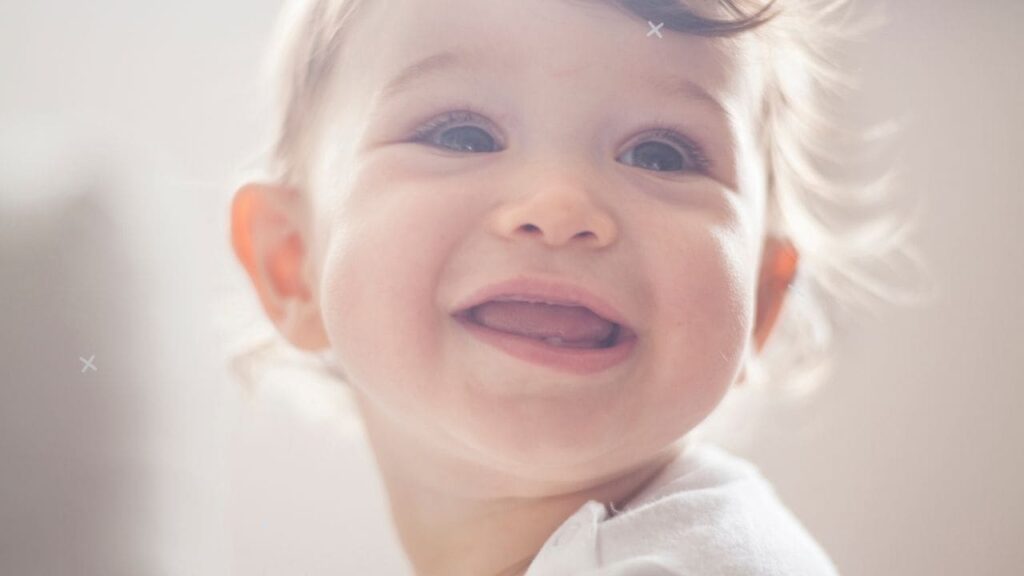
Why Do Babies Grind Their Teeth?
Now that we’ve covered when babies tend to start grinding their teeth, let’s delve into the potential reasons behind this perplexing habit.
Teething Pain
One of the most common culprits is teething pain. As those brand-new teeth start pushing their way through the gums, it can cause significant discomfort for your baby. Grinding their teeth may be their instinctive way of trying to alleviate some of that pressure and pain.
Improperly Aligned Teeth
In some cases, a baby’s teeth may come in misaligned, leading to an improper bite. This can cause discomfort and prompt them to grind their teeth in an attempt to find a more comfortable jaw position.
Ear-Nose-Throat Illnesses
Ear infections, nasal congestion, or sore throats can all cause pain and discomfort in the ear-nose-throat (ENT) region. This, in turn, can lead to increased teeth grinding as your baby tries to cope with the unpleasant sensations.
Sleep Disordered Breathing
Conditions like sleep apnea, which disrupt normal breathing patterns during sleep, have been linked to higher rates of nighttime teeth grinding in babies and young children.
Stress, Anxiety, Hyperactivity
Just like adults, babies can experience stress, anxiety, and hyperactivity. And one of the ways these emotional and behavioral states can manifest is through teeth grinding or jaw clenching.
Family History
If one or both parents have a history of bruxism, their baby may be more prone to developing the same habit. This suggests that there could be a genetic component at play.
Other Potential Causes
In some instances, baby teeth grinding may stem from other underlying factors, such as nutritional deficiencies, allergies, or developmental disorders. It’s always best to consult with a healthcare professional to rule out any potential underlying medical conditions.
| Cause | Description |
|---|---|
| Teething Pain | As new teeth erupt, the pressure and discomfort can cause grinding. |
| Misaligned Teeth | An improper bite can lead to grinding to find a comfortable jaw position. |
| Ear/Nose/Throat Issues | Infections or congestion in these areas can cause pain and grinding. |
| Sleep Disorders | Conditions like sleep apnea disrupt sleep and increase nighttime grinding. |
| Stress/Anxiety | Babies can experience stress, which manifests as teeth grinding or jaw clenching. |
| Genetics | If parents have a history of bruxism, babies may be more prone to developing the habit. |
What Teeth Do Babies Grind?
While the habit of teeth grinding in babies can persist and even transition to their permanent teeth if left unaddressed, it typically involves the grinding of their primary (baby) teeth.
The Dangers of Untreated Infant Teeth Grinding
While the occasional bout of teeth grinding may seem harmless, excessive and untreated bruxism can actually lead to several complications, some of which can have long-lasting effects on your little one’s dental health and overall well-being.
Here are some of the potential dangers of leaving infant teeth grinding unchecked:
- Wearing down of tooth enamel: Excessive grinding can cause the protective enamel layer on your baby’s teeth to wear down, increasing their risk of developing cavities, sensitivity, and other dental issues.
- Jaw disorders: Prolonged teeth grinding can lead to problems with the temporomandibular joint (TMJ), which connects the jawbone to the skull. This can result in pain, headaches, and difficulty opening or closing the mouth.
- Disrupted sleep patterns: The grinding sounds and potential discomfort associated with bruxism can disrupt your baby’s sleep, leaving them cranky and fatigued during the day.
- Headaches and earaches: In some cases, the grinding and clenching associated with bruxism can cause headaches and earaches for your little one.
Symptoms of Baby Grinding Teeth
So, how can you tell if your baby is grinding their teeth? There are a few telltale signs to watch out for:
Audible Signs
The most obvious symptom is, of course, the grinding sound itself. Many parents first become aware of their baby’s bruxism when they hear that unmistakable squeaky, grating noise coming from the nursery or crib.
Clinical Signs
In addition to the audible signs, there are a few clinical signs that may indicate your baby is grinding their teeth:
- Jaw clenching: You may notice your baby’s jaw muscles tightening or clenching, even when they’re not actively grinding their teeth.
- Chipped, worn, or cracked teeth: Over time, excessive grinding can cause visible damage to your baby’s teeth, such as chips, cracks, or a worn-down appearance.
- Flattening of enamel surfaces: In severe cases, the constant grinding can cause the enamel surfaces of your baby’s teeth to become flattened or smoothed down.
If you notice any of these signs, it’s a good idea to consult with your pediatrician or dentist to address the issue before it leads to further complications.
Now that we’ve covered the causes, potential dangers, and symptoms of baby teeth grinding, let’s dive into some potent solutions to help conquer this agonizing problem.
| Audible Signs | Clinical Signs |
|---|---|
| Grinding/grating noise | Jaw clenching |
| Chipped or worn teeth | |
| Flattened enamel surfaces |
Home Remedies for Baby Teeth Grinding
Before exploring medical treatments, there are several home remedies you can try to help alleviate your baby’s teeth grinding and the discomfort associated with it.
Managing Teething Pain
If teething pain seems to be the primary culprit behind your baby’s grinding habit, there are a few gentle remedies you can try:
- Massaging sore gums: Gently massaging your baby’s gums with a clean finger or a chilled (not frozen) teething ring can help provide relief from the pressure and discomfort.
- Providing chilled teething toys: Offering your baby a chilled (not frozen) teething ring, washcloth, or even a piece of chilled fruit or vegetable to gnaw on can help numb the pain and reduce the urge to grind.
- Gentle gum rubbing: Before bedtime, try gently rubbing your baby’s gums with a soft, clean toothbrush. This can help soothe any discomfort and promote relaxation, potentially reducing nighttime grinding.
Managing Stress Levels
If stress, anxiety, or hyperactivity seems to be a contributing factor to your baby’s teeth grinding, creating a calm and soothing environment can work wonders.
Here are some tips for managing your little one’s stress levels:
- Gentle massages: Giving your baby a gentle massage before bedtime can help them relax and unwind, potentially reducing the tendency to grind their teeth.
- Soothing sounds: Playing calming music or using a white noise machine in the nursery can create a serene environment that promotes relaxation.
Building Good Sleep Habits
Proper sleep hygiene can also play a crucial role in minimizing teeth grinding in babies. Here are some tips for building good sleep habits:
- Stick to a consistent bedtime routine: Establishing a calming routine before bedtime, such as a warm bath, a gentle massage, and a soothing story, can help your baby relax and prepare for a restful night’s sleep.
- Ensure your baby is well-rested: Overtiredness can contribute to stress and anxiety, which in turn may exacerbate teeth grinding. Ensure your baby is getting enough age-appropriate sleep by following recommended sleep schedules.
- Keep the sleep environment cool, dark, and quiet: Creating a sleep-friendly environment can promote better quality sleep and potentially reduce nighttime grinding.
Promoting Oral Hygiene
Maintaining good oral hygiene habits can also help alleviate discomfort and prevent further dental issues associated with teeth grinding.
- Gently brush your baby’s teeth and gums after meals and before bedtime. Use a soft-bristled toothbrush and water (no toothpaste until they’re old enough to spit it out).
- Avoid giving your baby hard, crunchy foods that may strain their jaw muscles and contribute to grinding.
Balanced Diet
A well-balanced, nutritious diet can also support your baby’s overall health and potentially reduce their tendency to grind their teeth.
- Emphasize soft, easily chewable foods that won’t put unnecessary strain on their jaw muscles.
- Incorporate plenty of fruits, vegetables, and whole grains to ensure they’re getting the necessary vitamins and minerals.
- Ensure your baby stays hydrated, as dehydration can contribute to muscle tension and discomfort.
| Age Range | Remedies |
|---|---|
| 0-6 months | Gum massages, chilled teething rings |
| 6-12 months | Chilled fruits/veggies to gnaw on, soft toothbrush gum rubbing |
| 1-2 years | Chewy toys, stress management techniques (e.g., white noise, massage) |
| 2-4 years | Mouth guards (with pediatric dentist’s guidance), relaxing bedtime routines |
Medical Treatments to Stop Baby from Grinding Teeth
If home remedies aren’t providing sufficient relief, or if your baby’s teeth grinding is severe, you may need to explore medical treatments in consultation with your pediatrician or dentist.
Over-the-Counter Medication
For mild to moderate cases of teeth grinding, your healthcare provider may recommend over-the-counter pain relievers or numbing gels to temporarily alleviate any discomfort or pain associated with the grinding.
- Pain relievers: Acetaminophen or ibuprofen can help reduce inflammation and discomfort caused by grinding.
- Numbing gels or compounds: These can provide temporary relief by numbing the gums and teeth, reducing the sensation of grinding.
Dental Mouth Guards
For more persistent or severe cases of teeth grinding, your dentist may recommend the use of a custom-fitted mouth guard or night guard.
- Custom night guards: These appliances are designed to fit snugly over your baby’s teeth, creating a barrier between the upper and lower teeth to prevent them from grinding against each other.
- Protective mouth guards: Similar to night guards, these mouth guards can be worn during the day to protect your baby’s teeth from excessive wear and tear caused by daytime grinding.
Muscle Relaxants
In extreme cases, where teeth grinding is severe and unresponsive to other treatments, your healthcare provider may consider prescribing muscle relaxants to reduce the tension in your baby’s jaw muscles and minimize grinding.
However, it’s important to note that muscle relaxants should only be used under close medical supervision and as a last resort, as they can have potential side effects, especially in young children.
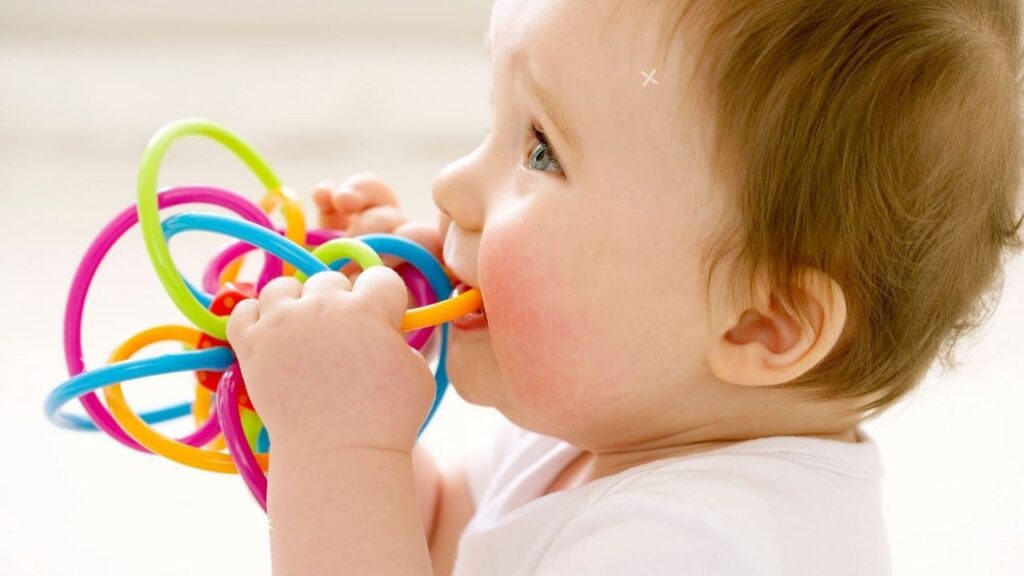
When to See a Doctor About Baby Grinding Teeth
While occasional teeth grinding is common and often resolves on its own, there are certain instances when it’s crucial to seek professional medical or dental attention.
Excessive Tooth Wear
If you notice excessive wear, cracks, chips, or enamel loss on your baby’s teeth, it’s a clear sign that the grinding has become severe enough to cause physical damage. In such cases, it’s essential to consult with a pediatric dentist to evaluate the situation and determine the appropriate course of action.
Grinding With Illness
If your baby’s teeth grinding is accompanied by other symptoms such as fever, earache, or signs of illness, it’s important to consult with your pediatrician. These symptoms may indicate an underlying medical condition that needs to be addressed.
Persistent Grinding
If your baby’s teeth grinding persists for more than a few weeks, despite trying various home remedies, it’s a good idea to seek professional guidance. Prolonged grinding can lead to further complications, and a healthcare professional can help identify and address the root cause.
Dealing With Daytime vs. Nighttime Bruxism
While nighttime teeth grinding is more common and often the first type of bruxism that parents become aware of, it’s important to note that some babies also grind their teeth during the day.
For daytime grinding, here are some tips:
- Provide chewy toys or teethers: Offering your baby safe, chewable toys or teethers can help alleviate jaw tension and provide a constructive outlet for their gnawing urges.
- Gently massage jaw muscles: Gently massaging the muscles around your baby’s jaw can help relax them and potentially reduce the tendency to grind.
- Ensure proper sleep: Overtiredness can contribute to daytime grinding, so ensure your baby is getting enough age-appropriate sleep.
For nighttime grinding, consider the following:
- Use white noise or calming sounds: The gentle ambient noise can help soothe your baby and promote better sleep quality, potentially reducing nighttime grinding episodes.
- Keep bedtime routines consistent: Maintaining a consistent bedtime routine can help your baby relax and prepare for a restful night’s sleep, reducing the likelihood of teeth grinding.
- Consider lightweight mouth guards: If nighttime grinding is particularly severe, your dentist may recommend a lightweight, custom-fitted mouth guard to protect your baby’s teeth from excessive wear and tear.
Preventing Tooth Grinding Through Healthy Habits
In addition to addressing the immediate issue of teeth grinding, it’s also important to focus on establishing healthy habits that can help prevent or reduce the likelihood of this behavior in the long run.
Soft, Nutritious Diet
As mentioned earlier, a soft, nutritious diet that avoids hard, crunchy foods can help prevent unnecessary strain on your baby’s jaw muscles, reducing the tendency to grind.
Soothing Routines
Creating calming, screen-free routines before bedtime can help reduce stress and anxiety, which are common contributors to teeth grinding.
Relaxing Activities
Regularly engaging your baby in low-stress activities like gentle massages, tummy time, or reading can promote relaxation and potentially prevent the build-up of tension that can lead to grinding.
When to Call the Pediatric Dentist
While not all cases of baby teeth grinding require professional dental intervention, there are certain situations where it’s advisable to consult with a pediatric dentist:
- If you’re concerned about excessive tooth wear or damage caused by grinding.
- For a professional fitting and recommendation of a custom mouth guard or night guard, if necessary.
- For an evaluation of your baby’s bite and potential orthodontic treatment, if the grinding is related to misaligned teeth.
The Takeaway
While the sight (or sound) of your baby grinding their teeth can be unsettling, it’s important to remember that this is a common phase that many infants and young children go through. In most cases, it’s a temporary habit that resolves on its own as your little one’s permanent teeth come in.
However, by understanding the potential causes, being aware of the symptoms, and implementing the appropriate remedies or treatments, you can help ease your baby’s discomfort and prevent potential complications.
From managing teething pain and stress levels to promoting good sleep habits and oral hygiene, there are numerous strategies you can try at home before considering medical interventions.
Remember, every baby is unique, and what works for one may not work for another. It’s all about being patient, observant, and proactive in finding the right solution for your little one.
And above all, don’t hesitate to seek professional guidance if you have any concerns or if the teeth grinding persists despite your best efforts. Your pediatrician or dentist can provide valuable insights and recommendations tailored to your baby’s specific needs.
Conclusion:
Parenting is a journey filled with both joyous moments and challenging phases, and baby teeth grinding is just one of those temporary hurdles you may encounter along the way. But with a little knowledge, patience, and the right strategies, you can conquer this agonizing problem and ensure your little one’s dental health remains in tip-top shape.
So, take a deep breath, embrace the process, and remember that this too shall pass. Keep those tiny teeth healthy and that precious smile shining bright, one day (and one grind-free night) at a time.
FAQ – Baby Grinding Teeth
Is it normal for babies to grind their teeth?
Yes, teeth grinding, also known as bruxism, is a very common habit among infants and young children. Studies suggest that up to three out of every four babies experience some degree of teeth grinding. While it can be unsettling for parents, it’s generally considered a temporary phase that many babies go through, especially during the teething process.
What are the potential causes of baby teeth grinding?
There are several potential causes of baby teeth grinding, including:
- Teething pain: As new teeth erupt, the pressure and discomfort can lead babies to grind their teeth as a way to alleviate the pain.
- Misaligned teeth: If a baby’s teeth come in misaligned, they may grind their teeth to find a more comfortable jaw position.
- Ear, nose, or throat issues: Infections or congestion in these areas can cause pain and lead to teeth grinding as a coping mechanism.
- Sleep disorders: Conditions like sleep apnea that disrupt normal breathing patterns during sleep have been linked to higher rates of nighttime teeth grinding.
- Stress and anxiety: Just like adults, babies can experience stress and anxiety, which can manifest as teeth grinding or jaw clenching.
- Genetics: If one or both parents have a history of bruxism, the baby may be more prone to developing the habit.
What are the potential dangers of untreated baby teeth grinding?
While occasional teeth grinding may seem harmless, excessive and untreated bruxism can lead to several complications, including:
- Wearing down of tooth enamel, increasing the risk of cavities, sensitivity, and other dental issues.
- Jaw disorders like temporomandibular joint (TMJ) dysfunction, which can cause pain, headaches, and difficulty opening or closing the mouth.
- Disrupted sleep patterns, leading to fatigue and crankiness during the day.
- Headaches and earaches caused by the grinding and clenching associated with bruxism.
What home remedies can help alleviate baby teeth grinding?
There are several home remedies that can help alleviate baby teeth grinding and the associated discomfort, including:
- Managing teething pain: Massaging sore gums, providing chilled teething rings or frozen fruits/veggies to gnaw on, and gently rubbing gums with a soft toothbrush before bedtime.
- Managing stress levels: Creating a calm environment with gentle massages, soothing music or white noise, and plenty of playtime and cuddles.
- Building good sleep habits: Establishing a consistent bedtime routine, ensuring adequate rest, and keeping the sleep environment cool, dark, and quiet.
- Promoting oral hygiene: Gently brushing teeth and gums after meals and before bedtime, avoiding hard or crunchy foods that strain the jaw muscles.
- Providing a balanced diet: Emphasizing soft, easily chewable foods and ensuring proper hydration.
When should parents seek professional help for baby teeth grinding?
While occasional teeth grinding is common and often resolves on its own, parents should seek professional help in the following situations:
- If there is excessive wear, cracks, chips, or enamel loss on the baby’s teeth, indicating severe grinding.
- If the grinding is accompanied by other symptoms like fever, earache, or signs of illness, which could indicate an underlying medical condition.
- If the grinding persists for more than a few weeks despite trying various home remedies.
- If parents are concerned about the extent of the grinding or notice signs of discomfort or disrupted sleep in their baby.
In these cases, consulting with a pediatrician or pediatric dentist can help identify and address the root cause of the grinding, and provide appropriate treatment or recommendations, such as custom-fitted mouth guards or orthodontic appliances if necessary.
